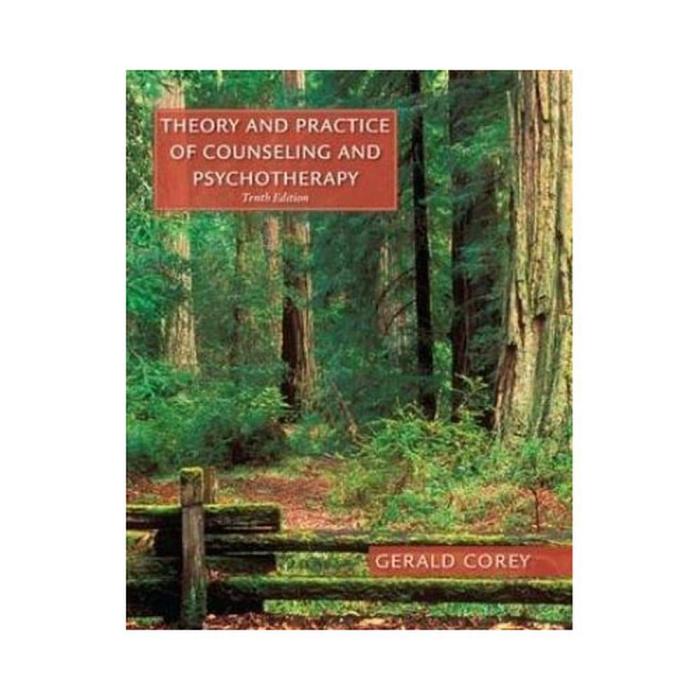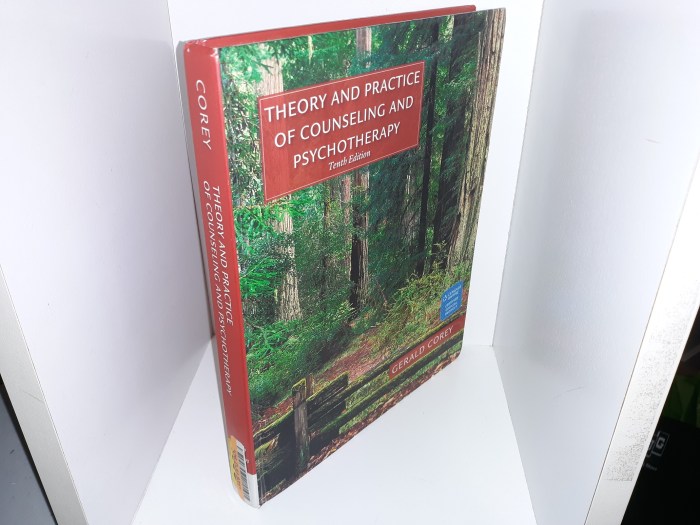Theory and practice of counseling and psychotherapy gerald corey – In “The Theory and Practice of Counseling and Psychotherapy,” Gerald Corey presents a comprehensive and engaging exploration of the major theoretical approaches, techniques, and ethical considerations in the field. This authoritative text serves as an invaluable resource for students, practitioners, and anyone seeking a deeper understanding of the counseling process.
Corey’s work provides a thorough overview of the counseling process, from establishing a strong therapeutic alliance to navigating ethical and legal issues. He emphasizes the importance of cultural sensitivity and the role of counseling in career development and crisis intervention.
1. Introduction to the Theory and Practice of Counseling and Psychotherapy by Gerald Corey

The book “Theory and Practice of Counseling and Psychotherapy” by Gerald Corey provides a comprehensive overview of the field of counseling and psychotherapy. It is a widely used textbook for students and practitioners alike. Corey draws on his extensive experience as a therapist and educator to offer a practical and engaging introduction to the major theoretical approaches, techniques, and ethical considerations in counseling and psychotherapy.
2. Major Theoretical Approaches to Counseling and Psychotherapy

Psychoanalytic Approach
The psychoanalytic approach focuses on the unconscious mind and the impact of early childhood experiences on personality development and psychological problems. Key concepts include the id, ego, and superego, as well as defense mechanisms and transference. Techniques include free association, dream analysis, and transference interpretation.
Behavioral Approach
The behavioral approach focuses on observable behaviors and the principles of learning. Key concepts include reinforcement, punishment, and modeling. Techniques include behavior modification, exposure therapy, and cognitive-behavioral therapy.
Humanistic Approach
The humanistic approach emphasizes the client’s potential for growth and self-actualization. Key concepts include unconditional positive regard, empathy, and authenticity. Techniques include active listening, reflection, and Gestalt therapy.
Cognitive Approach
The cognitive approach focuses on the role of thoughts and beliefs in psychological problems. Key concepts include schemas, cognitive distortions, and irrational beliefs. Techniques include cognitive restructuring, reality testing, and mindfulness.
3. The Counseling Process and Relationship
Stages of the Counseling Process
- Intake
- Assessment
- Treatment planning
- Intervention
- Termination
Importance of the Counseling Relationship, Theory and practice of counseling and psychotherapy gerald corey
The counseling relationship is a key factor in the success of therapy. The counselor provides a safe and supportive environment in which the client can explore their thoughts, feelings, and behaviors. The counselor also helps the client to develop insight into their problems and to find new ways of coping.
4. Techniques and Interventions in Counseling and Psychotherapy
General Techniques
- Active listening
- Reflection
- Summarization
- Confrontation
- Interpretation
Specific Interventions
- Cognitive restructuring
- Exposure therapy
- Behavioral activation
- Mindfulness meditation
- Dialectical behavior therapy
5. Ethical and Legal Issues in Counseling and Psychotherapy: Theory And Practice Of Counseling And Psychotherapy Gerald Corey
Ethical Principles
- Autonomy
- Beneficence
- Nonmaleficence
- Justice
Legal Considerations
- Confidentiality
- Informed consent
- Dual relationships
- Malpractice
Commonly Asked Questions
What are the major theoretical approaches to counseling?
Corey discusses the major theoretical approaches, including psychodynamic, humanistic, cognitive-behavioral, and systemic approaches.
How does Corey emphasize the importance of cultural sensitivity?
Corey highlights the need for counselors to be aware of and responsive to the cultural backgrounds of their clients.
What role does counseling play in career development?
Corey discusses how counselors can assist clients in exploring career options, making career decisions, and developing career plans.